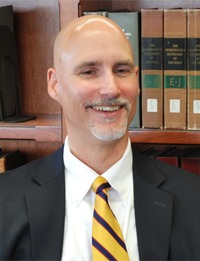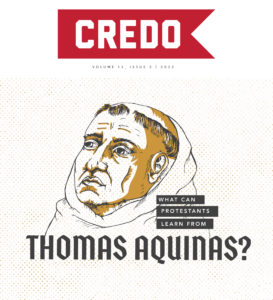As a young convert from unbelief to evangelical Christianity, in the mid-1970s, Francis Schaeffer (1912–84) was one of several evangelical writers who threw me an intellectual lifeline. From him I learned that my mind mattered to my faith, that Christians could engage with the culture in a thoughtful (and not merely reactionary) way. Nevertheless, aspects of his fundamentalist past remained with him. Further, he was briefly a student of and influenced by Cornelius Van Til (1885–1987) and his fairly relentless hostility to Thomas (c. 1224–74).
Thus, when I began to discover the Reformed confession in 1980–81, through Schaffer and Van Til I imbibed a fairly strong bias against Thomas, whom I had never read for myself. Through Schaffer and Van Til I imbibed a fairly strong bias against Thomas, whom I had never read for myself. Share on X I knew him only as the Roman Catholic theologian par excellence. From Van Til, I knew of Thomas only as “the great master of scholasticism,” and I inferred that “scholasticism” was code for rationalism, i.e., granting to reason the position of teacher (magister) rather than servant (ancilla).[1] I had the impression that Thomas had been mugged by Aristotle.[2] Indeed, I was given to think that Thomas was the source of much that ailed Christianity. In one tour de force, Van Til jumps from Aristotle, to Aquinas, to Immanuel Kant (1724–1804).[3] The two main things that I really took away from my brief early encounters with Thomas (mea culpa) were that he sought to demonstrate the existence of God in the “five ways” (ST, 1a.2, art. 3) and that he taught a “nature-grace dualism.”
When I began reading the orthodox Reformed writers for myself, however, I was surprised to see how favorable they were to Thomas. It put before me a choice: the neo-Calvinist account of our relations to Thomas (and others) or the classical Reformed approach to Thomas. Eventually, after reading Thomas more deeply for myself, I chose the latter.When I began reading the orthodox Reformed writers for myself, however, I was surprised to see how favorable they were to Thomas. Share on X
The first writer who began to challenge my assumptions about Thomas was Girolamo Zanchi (1516–90). At age 15 he entered the Augustinian monastery in Bergamo, after the death of his parents.[4] A decade later we find him in Lucca, studying with Peter Martyr Vermigli (1499–1562), who had become or was becoming an “evangelical” (a magisterial Protestant) and Reformed in his theology. Under the protection of Cardinal Gasparo Contarini (1483–1542), Vermigli was running what was effectively an underground Reformed seminary under the nose of the papacy. In Lucca, Zanchi was reading Bucer, Calvin, Muculus et al but before he read them, he had read Thomas. Patrick O’Banion writes, “Around 1536 he went off for additional education, probably to Padua, which boasted a renowned university. Over the next five or so years he studied ‘Aristotle, languages, and scholastic theology,’ especially Thomas Aquinas, who became an important influence.”[5]
With the death of Contarini, Vermigli had to flee to Strasbourg. Under Vermigli’s successor (Celso Martinengo, 1515–57), Zanchi was able to stay in Lucca for another two years before he joined the Italian diaspora. He went to Chiavenna and thence to Bern, Geneva, Lausanne, and then Strasbourg, where he succeeded his friend and teacher Vermigli. He would spend a tumultuous decade in Strasbourg before moving back to Chiavenna for three years and then to Heidelberg (1568–77), where he succeeded Zacharias Ursinus (1534–83) in the theology faculty. After the death of Frederick III, the Reformed were expelled from Heidelberg, he went with Ursinus and Frederick’s younger son Johan Casmir (1543-92) to Neustadt.
In Lucca, Zanchi read Bucer, Calvin, Muculus et al but before he read them, he had read Thomas. The evidence of Thomas’ influence on Zanchi is fairly obvious and abundant. As J. P. Donnelly theorized in 1976, it seems as though while in Heidelberg, Zanchi set out to write a Protestant version of the Summa Theologica.[6]
The evidence of Thomas’ influence on Reformed theologians like Zanchi is fairly obvious and abundant. Share on X Not surprisingly, however, when Zanchi had to choose between Thomas and his Reformed and Protestant commitments, he chose the Protestants. For example, “Zanchi’s assertion that God can operate contra ordinaria media conflicts with Thomist teaching on providence,” says Baschera and Moser.[7] The modern edition of De religione, is littered with footnote references to Thomas. Stefan Lindhom argues “Zanchi held Aquinas in higher regard than other scholastics, sometimes calling them the purest among them.”[8]
Indeed, we see Zanchi’s Reformed commitments (as distinct from his debt to Thomas) at the very beginning of De religione (1.5–6), where he takes a distinctly Reformed line on sola scriptura.[9] He took a high Reformed view of the Spiritual presence of Christ in the Supper (De religione, 16.16) in distinction from Thomas’ view of the Supper. Nevertheless, on election and reprobation, for example, he sounded very much like Thomas.
We now know that Otto Gründler’s (1961) thesis was wrong, that it confused method and metaphysic.[10] The question was never whether Zanchi was influenced by Thomas but how he appropriated Thomas in his project of articulating Reformed theology, piety, and practice. His background in Thomas gave him tools to meet the demands of the emerging counter-Reformation challenge to Reformed orthodoxy and thus set a pattern for Reformed scholars to follow in the coming century.
Endnotes
[1] Cornelius Van Til, Apologtics, 52
[2] E.g., Cornelius Van Til, A Survey of Christian Epistemology, 56.
[3] Cornelius Van Til, Christian Theistic Evidences, 35.
[4] This brief sketch follows Girolamo Zanchi, De religione christiana fides—Confession of the Christian Religion, ed., Luca Baschera and Christian Moser (Leiden: Brill, 2007), 1–13.
[5] Girolamo Zanchi, The Spiritual Marriage Between Christ and His Chuirch and Everyone of the Faithful, trans. Patrick O’Banion (Grand Rapids: Reformation Heritage Books, 2021), xvi.
[6] Zanchi, De religione, n. 66, p.11.
[7] Ibid., 157, n.68.
[8] Stefan Lindholm, “Jerome’s Zanchi’s Use of Thomas Aquinas,” in Manfred Svensson and David Van Drunen, ed. Aquinas Among the Protestants (John Wiley & Sons, Hoboken, NJ, 2018), 76.
[9] See also Richard A. Muller, Post-Reformation Reformed Dogmatics: The Rise and Development of Reformed Orthodoxy; Volume 1: Prolegomena to Theology, 2nd ed. (Grand Rapids, MI: Baker Academic, 2003), 111.
[10] R. Scott Clark, “Early Reformed Orthodoxy: Caspar Olevian and Antoine de La Faye,” in Carl R. Trueman and R. Scott Clark, ed., Protestant Scholasticism: Essays in Reassessment (Carlisle, UK: Paternoster Press, 116-17).


